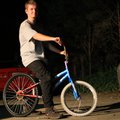 Hi everyone, welcome to the Hack Chat. It's time for us all to learn about what for a lot of us would be a dream job - working at the Jet Propulsion Lab. Arko joins us today to talk about what it's like to be a robotics engineer at JPL.
Hi everyone, welcome to the Hack Chat. It's time for us all to learn about what for a lot of us would be a dream job - working at the Jet Propulsion Lab. Arko joins us today to talk about what it's like to be a robotics engineer at JPL.
Welcome Arko! Can you start us off with a little about your background?
 Howdy everyone!
Howdy everyone!
 Hello
Hello
![]() Hello
Hello
 Sure! I'm an electrical engineer with a BS from Cal Poly Pomona. I have 12+ years in circuit design, robotics, and random hackery things.
Sure! I'm an electrical engineer with a BS from Cal Poly Pomona. I have 12+ years in circuit design, robotics, and random hackery things.
 Worked on many projects ranging from Mars rovers to DeLorean Time Machines.
Worked on many projects ranging from Mars rovers to DeLorean Time Machines.
 Is there any way for someone with years of professional software experience to get a job working at JPL even if they don't have a degree?
Is there any way for someone with years of professional software experience to get a job working at JPL even if they don't have a degree?
 For more info, I have a short portfolio online: http://arkorobotics.com/portfolio.html
For more info, I have a short portfolio online: http://arkorobotics.com/portfolio.html
 Nice
Nice
 Aw yeah, you have FRC on your site!
Aw yeah, you have FRC on your site!
 Hmmm good question... I personally don't know of any SW engineers without a degree and it maybe that there's a policy on having a degree. I would suggest reaching out to our HR department for a better answer: https://jpl.jobs/
Hmmm good question... I personally don't know of any SW engineers without a degree and it maybe that there's a policy on having a degree. I would suggest reaching out to our HR department for a better answer: https://jpl.jobs/
 Oddly enough, some of the best SW engineers I know don't have degrees...
Oddly enough, some of the best SW engineers I know don't have degrees...
 What's been your favorite project at JPL?
What's been your favorite project at JPL?
 @Christopher Bero Yes! I was part of Team 589 for all 4 years of high school and went back to mentor :)
@Christopher Bero Yes! I was part of Team 589 for all 4 years of high school and went back to mentor :)
 Ok cool.
Ok cool.
 Nice!
Nice!
 hmmm, I'd have to say the Mars 2020 Rover's Lander Vision System:
hmmm, I'd have to say the Mars 2020 Rover's Lander Vision System:
 That looks like a pretty intense setup.
That looks like a pretty intense setup.
 I had the opportunity to fly in a helicopter at 17000ft to test hardware destined for mars.. so that has to be my favorite (so far!): https://twitter.com/arkorobotics/status/1132341128848498688
I had the opportunity to fly in a helicopter at 17000ft to test hardware destined for mars.. so that has to be my favorite (so far!): https://twitter.com/arkorobotics/status/1132341128848498688
 Yeah, we packed *a lot* of hardware into that helicopter
Yeah, we packed *a lot* of hardware into that helicopter
 What would you say is the best project that has already been launched?
What would you say is the best project that has already been launched?
![]() DeLorean Time machine???
DeLorean Time machine???
 For context, we designed and developed a very powerful flight computer/vision system for the M2020 Rover (https://mars.jpl.nasa.gov/mars2020/mission/technology/entry-descent-landing/) so that it can figure out where it is during landing and to divert away from hazards
For context, we designed and developed a very powerful flight computer/vision system for the M2020 Rover (https://mars.jpl.nasa.gov/mars2020/mission/technology/entry-descent-landing/) so that it can figure out where it is during landing and to divert away from hazards
 Sweet
Sweet
 We packed an engineering model of the flight hardware and a bunch of "ground support equipment" hacks into the helicopter as well as a gimbal with a camera and IMU on it
We packed an engineering model of the flight hardware and a bunch of "ground support equipment" hacks into the helicopter as well as a gimbal with a camera and IMU on it
 and used the gimbal to simulate the parachute motions during descent.
and used the gimbal to simulate the parachute motions during descent.
 Nice
Nice
 Were you testing more of the algorithms that will be used for landing or the actual hardware that will fly on the mission too?
Were you testing more of the algorithms that will be used for landing or the actual hardware that will fly on the mission too?
 JPL has this philosophy of "Test as you fly. Fly as you test", meaning you should test your system like how you plan to fly it
JPL has this philosophy of "Test as you fly. Fly as you test", meaning you should test your system like how you plan to fly it
 and remember to fly as you tested it :)
and remember to fly as you tested it :)
 @Dan Maloney Great question. It was a full systems test.
@Dan Maloney Great question. It was a full systems test.
 Up until then, we had tested everything in pieces. So this field test used final flight software and hardware in the most 'flight like' conditions possible
Up until then, we had tested everything in pieces. So this field test used final flight software and hardware in the most 'flight like' conditions possible
 The actual flight hardware itself is actually already in the rover () and was tested separately
The actual flight hardware itself is actually already in the rover () and was tested separately
![]() What has been your hardest proyect to achieve?
What has been your hardest proyect to achieve?
 more so a hardware design verifcation test (TVAC/EMI EMC/Vibe/Shock)
more so a hardware design verifcation test (TVAC/EMI EMC/Vibe/Shock)
 what we flew in the heli was a flight replica
what we flew in the heli was a flight replica
 So 2020 is like the size of a Mini Cooper? Maybe a bit bigger?
So 2020 is like the size of a Mini Cooper? Maybe a bit bigger?
 @gmarmolburgos hmmm, I'd have to say M2020 was the most difficult overall due to complexity
@gmarmolburgos hmmm, I'd have to say M2020 was the most difficult overall due to complexity
 Not to say my other tasks haven't been difficult
Not to say my other tasks haven't been difficult
 :P
:P
![]() Thanks 😊
Thanks 😊
 @Dan Maloney M2020 is the same size (ish) but with more instruments - Humans for scale
@Dan Maloney M2020 is the same size (ish) but with more instruments - Humans for scale
 What's the project lifecycle like at JPL? What kind of teams are there? Do you have multiple tasks/projects going at once?
What's the project lifecycle like at JPL? What kind of teams are there? Do you have multiple tasks/projects going at once?
 Love this question
Love this question
 How does the component selection process change when designing for environments as harsh as space? What are some surprising things you need to take into account?
How does the component selection process change when designing for environments as harsh as space? What are some surprising things you need to take into account?
 That's a big rover.
That's a big rover.
![]() What would you recommend a high school student to read about if he wants to study aeroespacial engerneering? (Any books or authors you could recommend) (podcasts even)
What would you recommend a high school student to read about if he wants to study aeroespacial engerneering? (Any books or authors you could recommend) (podcasts even)
 So project lifecycles vary from task to task, as do teams
So project lifecycles vary from task to task, as do teams
 What programming language has been the most proven to use when making the rovers/probes?
What programming language has been the most proven to use when making the rovers/probes?
 So JPL, in general, has two types of projects: Flight and Non-Flight
So JPL, in general, has two types of projects: Flight and Non-Flight
 most folks work Flight only
most folks work Flight only
 some work Non-Flight only... and there are a few who work both
some work Non-Flight only... and there are a few who work both
 I happen to be "both". Which can be really challenging from a time management perspective, but it allows me to live in both worlds and to exchange experiences between them.
I happen to be "both". Which can be really challenging from a time management perspective, but it allows me to live in both worlds and to exchange experiences between them.
 As for teams, again it varies, but my rule of thumb is to pick working with good teams.
As for teams, again it varies, but my rule of thumb is to pick working with good teams.
 cool tasks come second because... lets face it.. this place is a candy store of tasks. It's hard to find a lame task.
cool tasks come second because... lets face it.. this place is a candy store of tasks. It's hard to find a lame task.
 Awesome haha
Awesome haha
 As for component selection, we have an internal catalog of not only known good parts, but designs as well
As for component selection, we have an internal catalog of not only known good parts, but designs as well
![]() *Bows down in reverence*
*Bows down in reverence*
![]() JPL sounds a bit like nerdvana
JPL sounds a bit like nerdvana
 Need 5V in your design? Boom, known working design with traceable testing and stocked parts
Need 5V in your design? Boom, known working design with traceable testing and stocked parts
 workign footprints and schematic, etc
workign footprints and schematic, etc
 I'm not sure you're allowed to answer this, but who do you guys go to to get your PCB prototypes/finals done
I'm not sure you're allowed to answer this, but who do you guys go to to get your PCB prototypes/finals done
 Lots of different vendors
Lots of different vendors
 Huh
Huh
 Flight tasks require ITAR compliance, so that sorta limits us.
Flight tasks require ITAR compliance, so that sorta limits us.
 but for prototype projects, I like to use US vendors
but for prototype projects, I like to use US vendors
 does JPL use some formal verification when programming, like Spark/Ada?
does JPL use some formal verification when programming, like Spark/Ada?
 hah, Ada
hah, Ada
 Chinese or American PCB vendors?
Chinese or American PCB vendors?
 American. Purchasing out of the country is a MAJOR pain and requires justification
American. Purchasing out of the country is a MAJOR pain and requires justification
 was not Ada's fault that one rocket crashed :-)
was not Ada's fault that one rocket crashed :-)
 there are formal verification processes
there are formal verification processes
 lots of code reviews
lots of code reviews
 for the most part, we use C/C++ for SW and Verilog for HW
for the most part, we use C/C++ for SW and Verilog for HW
 ^ My favorite talk on Flight SW at JPL
^ My favorite talk on Flight SW at JPL
 Awesome
Awesome
 cool, will watch it. But formal verification is very difficult for C, but I guess you use some standard like MISRA C?
cool, will watch it. But formal verification is very difficult for C, but I guess you use some standard like MISRA C?
 We def do
We def do
 We use a bunch of tools like coverity for static analysis
We use a bunch of tools like coverity for static analysis
 and dynamic
and dynamic
 internal tools too
internal tools too
 @Frank Buss From wikipedia it looks like: "The NASA Jet Propulsion Laboratory C Coding Standards[6] are based on MISRA-C:2004."
@Frank Buss From wikipedia it looks like: "The NASA Jet Propulsion Laboratory C Coding Standards[6] are based on MISRA-C:2004."
 you can still do a lot of silly things in C, why not Ada? It is supposed to be much safer
you can still do a lot of silly things in C, why not Ada? It is supposed to be much safer
 we have a lot of 'lessons learned' from past missions which we incorporate into flight code rules
we have a lot of 'lessons learned' from past missions which we incorporate into flight code rules

https://en.wikipedia.org/wiki/The_Power_of_10:_Rules_for_Developing_Safety-Critical_Code
The Power of 10: Rules for Developing Safety-Critical Code
From Wikipedia, the free encyclopedia Jump to navigation Jump to search The Power of 10 Rules were created in 2006 by Gerard J. Holzmann of the NASA/JPL Laboratory for Reliable Software. The rules are intended to eliminate certain C coding practices which make code difficult to review or statically analyze.
 everyone one of these rules traces back to a mission failure
everyone one of these rules traces back to a mission failure
 Ada's cool, but I'm a Rust person myself :P
Ada's cool, but I'm a Rust person myself :P
 *waits for fight to ensue*
*waits for fight to ensue*
 I know that recently a lot of software dev has been moving over to the cloud, is there anything being done using cloud computing at JPL?
I know that recently a lot of software dev has been moving over to the cloud, is there anything being done using cloud computing at JPL?
 LOSTS
LOSTS
 Is there anything JPL/NASA publishes that you feel doesn't get seen enough? Cool images or interesting datasets?
Is there anything JPL/NASA publishes that you feel doesn't get seen enough? Cool images or interesting datasets?
 LOTS*
LOTS*
 we do more than just code for flight hardware, in fact those teams are much smaller than the other apps we make inhouse
we do more than just code for flight hardware, in fact those teams are much smaller than the other apps we make inhouse
![]() hey arko, im not sure how relevant this is to you, but what are your thoughts on the future of RF engineers in the space industry? Would look to work at JPL or NASA one day on their satellites/comms. Currently at an internship in Pasadena lol, literally down the street from JPL.
hey arko, im not sure how relevant this is to you, but what are your thoughts on the future of RF engineers in the space industry? Would look to work at JPL or NASA one day on their satellites/comms. Currently at an internship in Pasadena lol, literally down the street from JPL.
![]() love*
love*
 I cant really speak to it since im not a cloud person :P
I cant really speak to it since im not a cloud person :P
 @Christopher Bero need to think about that. The JPLRaw youtube channel is pretty cool
@Christopher Bero need to think about that. The JPLRaw youtube channel is pretty cool

https://www.youtube.com/channel/UCYt2JN2z3ZXQpgPHt_eKcTw
JPLraw
JPL Raw is a channel used by NASA's Jet Propulsion Laboratory to deliver on-demand video to news media and others. The majority of video on this channel cons...
 I work at Chabot Space and Science Center in Oakland, we take advantage of the JPL assets being available in a lot of our work. From images, to 3d model to code and data
I work at Chabot Space and Science Center in Oakland, we take advantage of the JPL assets being available in a lot of our work. From images, to 3d model to code and data
 Thanks!
Thanks!
 Oh, nice!
Oh, nice!
 And being able to reach out to The Studio has been a great resource in exhibit development
And being able to reach out to The Studio has been a great resource in exhibit development
 @baldwinngo0813 Nice! I know we are always looking for great RF engineers, I'd recommend applying if you are interested. For background, I applied to JPL 12+ times
@baldwinngo0813 Nice! I know we are always looking for great RF engineers, I'd recommend applying if you are interested. For background, I applied to JPL 12+ times
 Woah, to different areas inside?
Woah, to different areas inside?
 sometimes it's just that I didnt have enough experience or that they had already filled the position
sometimes it's just that I didnt have enough experience or that they had already filled the position
 Ah.
Ah.
 What was different about the last time (other than getting the job)
What was different about the last time (other than getting the job)
 @morgan nice!
@morgan nice!
 @arko do you ever get to do work with The Studio?
@arko do you ever get to do work with The Studio?
 @Adam Fresh out of college. Timing. Made connections at JPL so I had a foot in the door.
@Adam Fresh out of college. Timing. Made connections at JPL so I had a foot in the door.
 @morgan Not familiar, you mean the media department?
@morgan Not familiar, you mean the media department?
 Lutetium
Lutetium
Discussions
Become a Hackaday.io Member
Create an account to leave a comment. Already have an account? Log In.